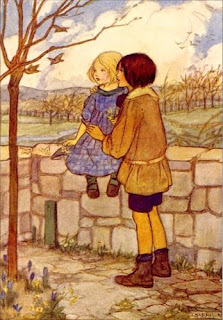Ingredients:
This is based on chapter one of the 400 stanzas of Aryadeva. The 400 stanzas looks like something very valuable to meditate on, but not necessarily easy.
The following haiku version is written instead from the point of view of the initiate being led to contemplate death and impermanence, and thus give up unwarranted fearlessness and certainty that things are permanent. There is therefore a trajectory to the argument. This contemplation and acceptance of Death is a powerful foundation, and reminiscent of the realization that must dawn on the Fool when stepping out into the abyss.
This was not easy to write, not easy to read, and not easy to contemplate on either which I am yet to fully do, so I might need to edit things and I'm open to suggestions of what might need editing.
The image is "The Angel of Death" (1880) by Evelyn Pickering de Morgan.
The following haiku version is written instead from the point of view of the initiate being led to contemplate death and impermanence, and thus give up unwarranted fearlessness and certainty that things are permanent. There is therefore a trajectory to the argument. This contemplation and acceptance of Death is a powerful foundation, and reminiscent of the realization that must dawn on the Fool when stepping out into the abyss.
This was not easy to write, not easy to read, and not easy to contemplate on either which I am yet to fully do, so I might need to edit things and I'm open to suggestions of what might need editing.
The image is "The Angel of Death" (1880) by Evelyn Pickering de Morgan.
Directions:
Living in Death’s realm,
Unaware and unafraid,
Sleeping like a star…
I don’t like to think
Of that far off place and time
When my life will end.
Should Death come too soon,
I would face him unperturbed,
Knowing I have lived.
If among my kin,
I alone should suffer Death,
That I would regret.
Though jealous of youth,
Sickness heals, age matures, just
Death I can’t outsmart.
That Death is common
Does not make its suffering less,
That I should bear it.
That Death’s uncertain,
Does not mean I should forget
Like cows for slaughter.
Let me live and love,
Each fibre of existence,
Each fleeting moment.
Should I fix my goal
On wealth or honour — then die,
All to what avail?
I shall not exchange
This short life for future gain,
Nor sin to guard it.
Like a passing stream,
This life, this thought, this haiku
Dies, each instant new.
Though I’m not attached
To this fragile earthen frame
May my line live on.
I grieve that one day
Son and daughter pass away,
I forget myself!
A child does not choose
To bear this heavy burden
Of my life and death.
Fathers love their sons
More than sons love their fathers,
Hard then to succeed.
Mother’s love for child
Is supreme, yet does it not
Desire obedience?
Were love absolute,
The suffering of parting
Would last forever.
What good love’s longing?
Knowing it but harms oneself,
Why languish in it?
What hypocrisy
To grieve in false sympathy
For affection's sake.
Meeting and parting,
Friendship and loss, joy and pain,
All come together.
Times we had seem long.
Eternity is longer.
I break attachment.
Time is not my friend.
I marvel at the moment
And life slips away.
Afraid, I delay,
But Death’s punishment is sure.
Time will force my hand.
Things gnaw at my mind
That first I do, yet what's done
Must be left behind.
The forest beckons.
Contemplating this life’s end,
I die to Death’s realm.
Unaware and unafraid,
Sleeping like a star…
I don’t like to think
Of that far off place and time
When my life will end.
Should Death come too soon,
I would face him unperturbed,
Knowing I have lived.
If among my kin,
I alone should suffer Death,
That I would regret.
Though jealous of youth,
Sickness heals, age matures, just
Death I can’t outsmart.
That Death is common
Does not make its suffering less,
That I should bear it.
That Death’s uncertain,
Does not mean I should forget
Like cows for slaughter.
Let me live and love,
Each fibre of existence,
Each fleeting moment.
Should I fix my goal
On wealth or honour — then die,
All to what avail?
I shall not exchange
This short life for future gain,
Nor sin to guard it.
Like a passing stream,
This life, this thought, this haiku
Dies, each instant new.
Though I’m not attached
To this fragile earthen frame
May my line live on.
I grieve that one day
Son and daughter pass away,
I forget myself!
A child does not choose
To bear this heavy burden
Of my life and death.
Fathers love their sons
More than sons love their fathers,
Hard then to succeed.
Mother’s love for child
Is supreme, yet does it not
Desire obedience?
Were love absolute,
The suffering of parting
Would last forever.
What good love’s longing?
Knowing it but harms oneself,
Why languish in it?
What hypocrisy
To grieve in false sympathy
For affection's sake.
Meeting and parting,
Friendship and loss, joy and pain,
All come together.
Times we had seem long.
Eternity is longer.
I break attachment.
Time is not my friend.
I marvel at the moment
And life slips away.
Afraid, I delay,
But Death’s punishment is sure.
Time will force my hand.
Things gnaw at my mind
That first I do, yet what's done
Must be left behind.
The forest beckons.
Contemplating this life’s end,
I die to Death’s realm.



